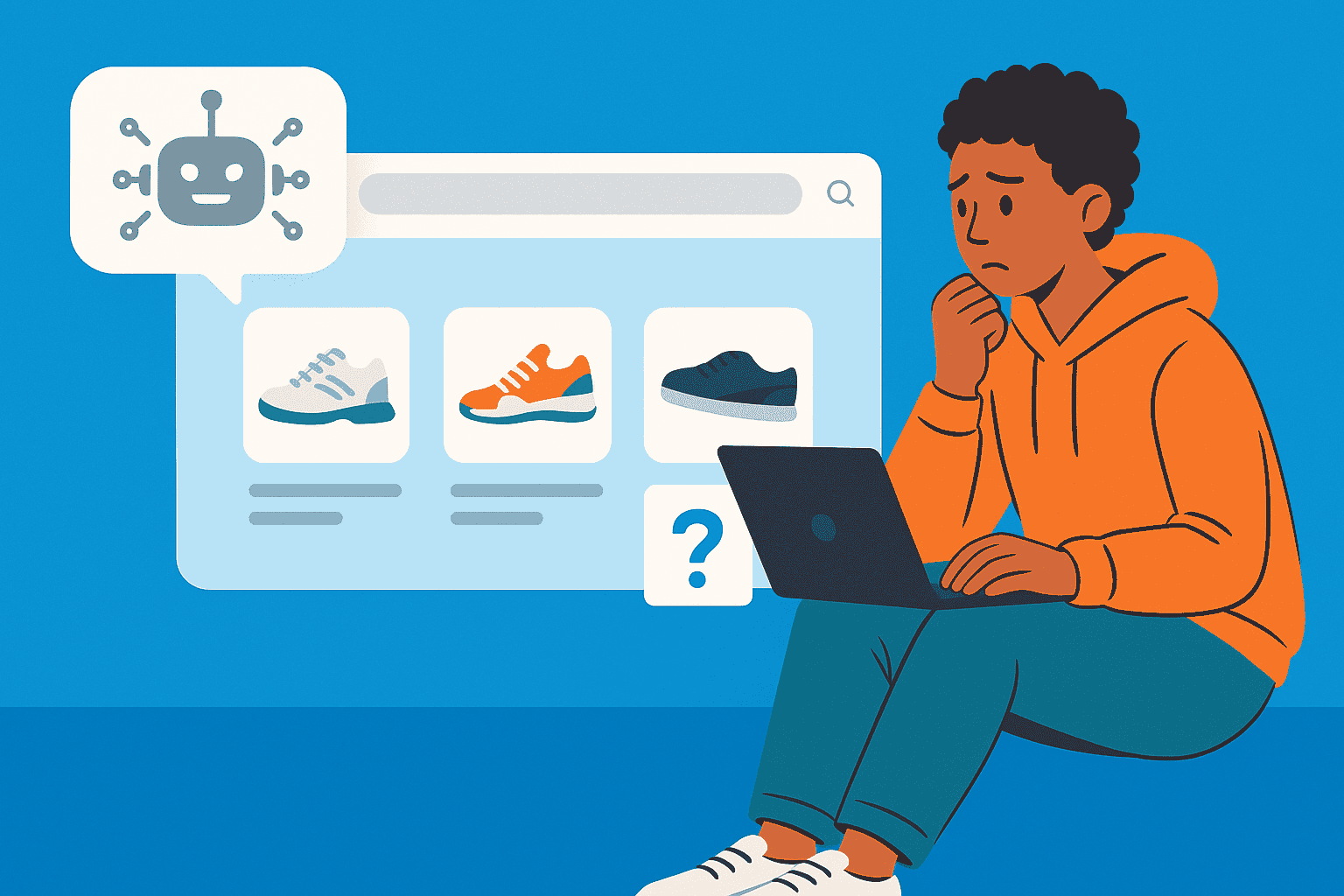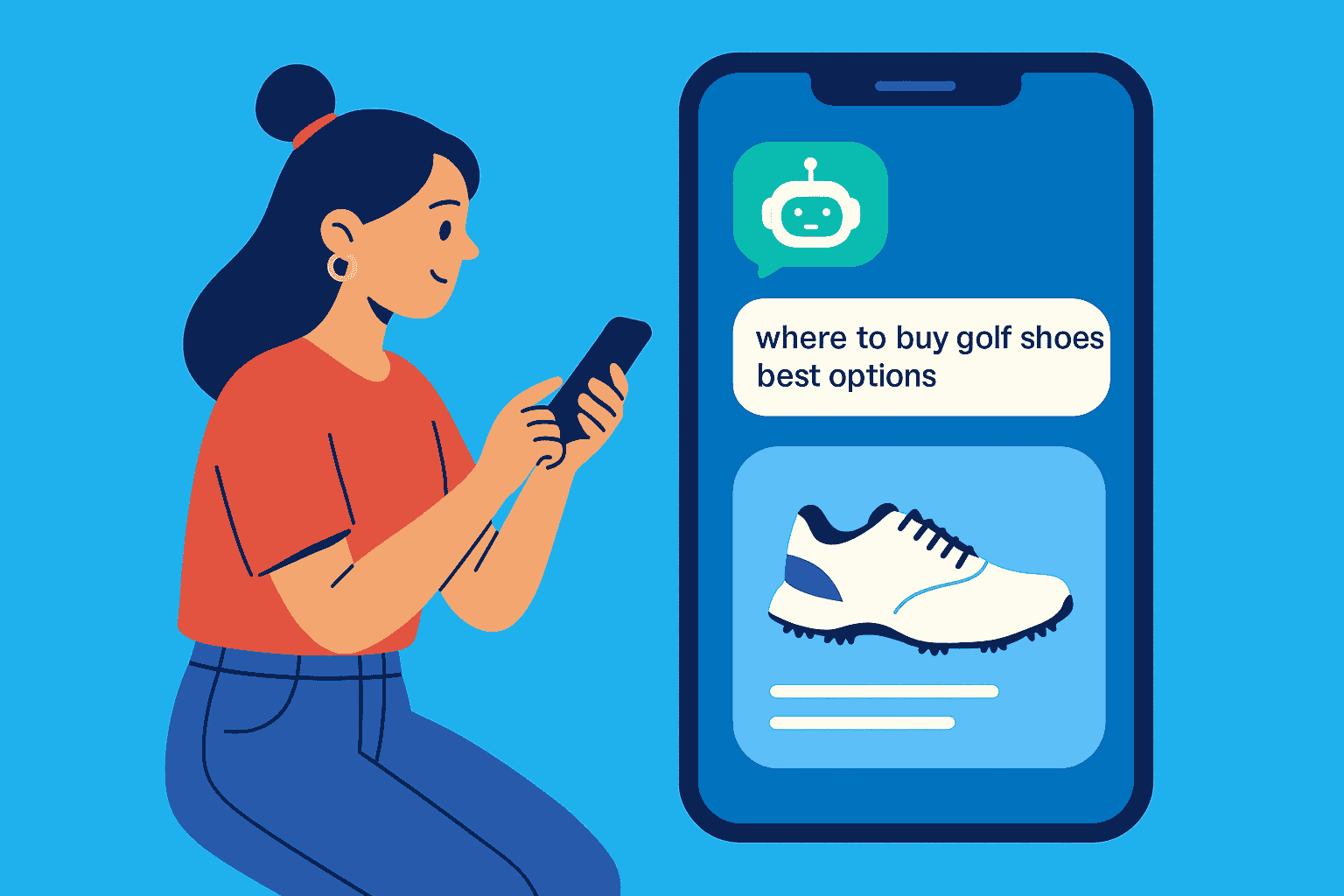AI & SEO: How to Optimize eCommerce Websites for AI-Driven Searches?

26% of brands have zero mentions in AI Overviews. And if you think that's just a small segment of search that doesn't matter? Think again. AI Overviews now appear in over 13% of all searches, and that number climbed 72% in just one month from February to March 2025.
We have spent the last 20 years watching SEO evolve. But this? This is different. We're not talking about another algorithm update you can game with backlinks or keyword stuffing. We're talking about a fundamental shift in how information gets discovered, consumed, and attributed.
The game has changed. And most marketing teams are still playing by the old rules.

Understanding AI Search SEO and Its Importance
AI search SEO isn't about optimizing for robots—it's about becoming the authoritative answer that AI systems trust enough to cite and recommend. Traditional SEO was a popularity contest. You got backlinks, optimized your meta descriptions, matched keywords, and hoped Google's algorithm smiled upon you. AI search engine optimization (or SEO for AI) is different. It's a credibility contest.
AI Overviews reduce clicks to websites by 34.5%, yet paradoxically, 76% of AI Overview citations come from pages ranking in Google's top 10 organic results. What does this tell us? The fundamentals still matter—but they're no longer sufficient.
How AI Search Engines Work: The Role of Large Language Models (LLMs)
Large Language Models process information through Retrieval-Augmented Generation (RAG). In plain English: they search for relevant information, extract patterns from that data, and then generate responses based on what they've learned. The critical difference? Traditional search engines index and rank. AI search engines understand, synthesize, and attribute.
When ChatGPT or Perplexity encounters your content, it's not just looking at keyword density or title tags. It's parsing your entire content structure, evaluating the clarity of your arguments, assessing the logical flow of information, and determining whether your content demonstrates genuine expertise or just keyword optimization.
Clear, well-structured content wins. Not because AI has preferences, but because ambiguity creates hallucinations. When your content structure is messy, AI systems make mistakes—and those mistakes mean you don't get cited. Think of it this way: if a human expert can't quickly understand your main points, an AI system has no chance.
Key Ranking Factors for AI Search SEO in 2026
Most of the "AI SEO tips" you're reading are recycled traditional SEO advice with "AI" slapped on top.
Here's what the data actually shows:
E-E-A-T Is More Critical Than Ever
Yes, I know Google says E-E-A-T itself isn't a specific ranking factor. But here's the nuance everyone misses: Google's systems identify a mix of factors that can determine which content demonstrates aspects of Experience, Expertise, Authoritativeness, and Trustworthiness.
AI systems are even more dependent on these signals because they need to determine source credibility at scale.
Experience means you've actually done the thing you're writing about. Not just researched it—experienced it. Product reviews from users who bought the product. Medical advice from practicing physicians. Business strategies from actual founders.
Expertise is demonstrable knowledge. Credentials matter, but so does consistent, accurate information across your entire content ecosystem.
Authoritativeness comes from external validation. Backlinks still matter, but brand mentions, media coverage, and citations from other authoritative sources matter more.
Trustworthiness is the foundation. Google's systems give even more weight to content that aligns with strong E-E-A-T for topics that could significantly impact health, financial stability, or safety.
Comprehensive, Intent-Focused Content
84% of marketers believe that aligning web content with search intent is the most effective use of AI. They're right.
But here's where most teams fail: they optimize for keywords, not intent. AI systems don't care about keyword density. They care about whether your content actually answers the question completely.
Shallow content dies in AI search. Period.
Structured Data Implementation
This is the secret weapon nobody's using properly. After adding structured data to 100,000 pages, Rotten Tomatoes saw a 25% increase in click-through rates. Food Network updated 80% of its pages to integrate search functionality, generating a 35% increase in visits.
Studies indicate that pages with schema markup often see a 40% higher CTR compared to pages without it.
But structured data isn't just about rich snippets anymore. It's about helping AI systems parse and understand your content accurately. When you implement proper Schema markup, you're essentially providing a content roadmap that AI can follow without getting lost.
Topical Authority Through Content Depth
AI systems are pattern-recognition machines. They identify expertise not from individual articles but from comprehensive coverage across related topics.
Build content hubs. Create topic clusters. Interlink strategically. This isn't new advice—but the stakes are higher now. AI systems evaluate your entire domain's expertise on a topic, not just individual pages.
Technical SEO Foundations
If AI can't crawl it, AI can't cite it. Simple as that.
Site speed, mobile-friendliness, clean HTML, proper indexing, secure protocols—these aren't optional. They're table stakes.
How to Optimize Search Results for AI: Step-by-Step Framework
1. Conversational Keyword Research
Stop thinking in keywords. Start thinking in questions. AI search responds to natural language queries. "Best project management software" is traditional SEO. "What project management software should a 50-person marketing team use if they're already using HubSpot and Slack?" is AI search.
Use tools like AnswerThePublic, AlsoAsked, and “People Also Ask” sections. But more importantly, talk to your customers. What questions are they actually asking?
2. Create "People-First" Content That AI Favors
70% of businesses believe that ChatGPT helps them create content faster. Great. Speed is wonderful. But here's the problem: if everyone's using AI to create content, nobody has a competitive advantage. Your advantage comes from authentic expertise. Original research. First-hand experience. Contrarian perspectives backed by data.
Write content that demonstrates you've actually done the work. Include specific examples, case studies with real numbers, and insights that could only come from direct experience.
3. Build Deep Topical Authority
Pick 3-5 core topics your brand owns. Not 50. Not "everything related to our industry." Three to five. Then create comprehensive, interconnected content ecosystems around those topics. Cover every angle, every question, every related concept. Link intelligently between related pieces.
AI systems don't cite random blog posts. They cite authoritative sources with demonstrated depth.
4. Implement Structured Data
Here's your cheat sheet for essential schema types:
FAQ Schema: Perfect for comprehensive Q&A content. Makes your content easily parsable for AI systems looking for quick answers.
HowTo Schema: Step-by-step guides that AI systems love to cite for procedural queries.
Product Schema: Include reviews, ratings, pricing, availability. Critical for e-commerce.
Article Schema: Author information, publish date, headline, images. Establishes content provenance.
Review Schema: User ratings and reviews that build trust signals.
Service Schema: For service businesses, this schema helps AI systems understand your offerings, locations, and specializations.
Use JSON-LD format. Test with Google's Rich Results Test. Validate regularly.
5. Leverage AI Tools Ethically
Use AI for:
- Content outlines and structure
- Identifying content gaps
- Analyzing competitor content
- Optimizing existing content
- Technical SEO audits
Don't use AI for:
- Writing final content without human expertise
- Creating shallow, keyword-stuffed articles
- Replacing genuine research and analysis
6. Optimize Existing Content for AI-Readiness
Audit your top 100 pages. Ask: Would an AI system confidently cite this? Does it demonstrate genuine expertise? Is it structured clearly? Does it answer questions completely? Update, consolidate, or delete. Those are your options.
7. Capture Commercial Intent
AI systems are getting better at understanding commercial queries. Optimize for local SEO. Claim your Google Business Profile. Get listed in relevant directories. Ensure your business information is consistent everywhere. When someone asks an AI system "best [your service] near me," you want to be the answer.
Technical SEO Best Practices to Appeal to AI Crawlers
Site Speed: AI crawlers have limited patience. If your page takes 5 seconds to load, you're already losing. Platforms like N7's Digital Experience Accelerator use AI/ML to optimize site delivery and maximize Core Web Vitals scores, improving website performance and SEO by 30-70%.
Mobile-Friendliness: 92.3% of users access the internet using a mobile phone. Mobile-first isn't optional.
Crawlability: Clean robots.txt, proper internal linking, XML sitemaps. Make it easy for AI systems to discover and understand your content. For JavaScript-heavy websites, implementing solutions like N7's SERA-GPT can significantly enhance crawling efficiency by serving rendered HTML versions of your dynamic pages to search engine and AI crawlers. If AI bots can't parse your JavaScript, they can't cite your content.
HTTPS: Secure connections aren't just good practice—they're trust signals AI systems evaluate.
Clean Structured Data: Broken schema markup is worse than no markup.
Building Natural Human Authority for AI Overviews
Strong online branding correlates positively with visibility in AI Overviews, with branded web mentions having the strongest correlation, followed by branded anchors and search volume.
Build your brand beyond your website:
- Get media coverage in authoritative publications
- Publish thought leadership on respected platforms
- Earn genuine citations and mentions
- Build a social media presence with real engagement
- Cultivate expert endorsements and testimonials
Backlinks have weaker correlations with visibility in AI Overviews compared to brand factors. Focus on brand-building, not just link-building.
Measuring Success with AI-Specific SEO Metrics
Traditional metrics aren't enough anymore. Track:
AI Citation Frequency: Are you being mentioned in AI-generated responses? Use tools to monitor ChatGPT, Perplexity, and Google AI Overviews.
AI-Driven SERP Rankings: Track visibility specifically in AI Overview results, not just traditional organic rankings.
Click-Through Rates from AI Responses: When AI systems cite you, are users clicking through? This metric indicates content quality and relevance.
Brand Mention Velocity: How often is your brand mentioned across the web? This correlates strongly with AI visibility.
Use Google Search Console to track impressions and clicks. Set up alerts for brand mentions. Monitor competitor visibility in AI search results.
Brands are using tools like Semrush's AI Search Toolkit for comprehensive tracking across ChatGPT, Perplexity, and Google AI Mode, Ahrefs Brand Radar for monitoring brand mentions and identifying what topics drive AI search traffic, and Otterly.AI for share of voice and citation analysis. Don't try to track everything. Start with Google Analytics 4 to set up custom channel groups for AI referral traffic (it's free and takes 15 minutes), then layer in one specialized AI visibility tool based on your budget and where your audience actually searches.
Future Trends in AI Search SEO and How to Stay Ahead
The landscape is evolving daily. Comparing the first 5 months of 2025 with the same time frame in 2024, total sessions from LLMs like ChatGPT, Perplexity, and Gemini surged from 17,076 to 107,100—a staggering 527% increase.
Here's what's coming:
Voice AI Expansion: Voice search is becoming conversational AI. Optimize for natural dialogue, not keywords.
Multimodal Search: AI systems that understand images, videos, and text simultaneously. Your visual content needs the same optimization rigor as your written content.
Real-Time AI: AI systems accessing live data, not just indexed content. Freshness will matter more than ever.
Personalized AI Recommendations: AI systems that understand user context and preferences. Generic content will die faster.
The Bottom Line
We're at an inflection point. The brands that adapt now—that build genuine authority, implement proper structured data, create comprehensive content, and establish human credibility—will dominate AI search for years.
The future of search isn't about ranking algorithms. It's about becoming the source that AI systems—and more importantly, humans—trust.

![Run an AI SEO Audit [FREE CHECKLIST]](https://www.n7.io/cdn.prod.website-files.com/61779da08a0e587b4ac301a6/68cd27e0e00e3ddbe46c73d2_AI%20Seo%20audit%20banner.png)


.png)